The Downside of Herbal Teas Unveiling the Hidden Risks
In recent years, herbal teas have gained immense popularity as a natural and healthy alternative to traditional tea and coffee. Packed with various health benefits, these teas are often praised for their ability to improve digestion, boost immunity, and even aid in weight loss. However, amidst the frenzy of praise, there lies a dark side to these seemingly harmless beverages. This article delves into the downside of herbal teas, revealing the hidden risks that may not be so beneficial after all.
1. Allergic Reactions

Herbal teas are made from various plants, flowers, and fruits, some of which can trigger allergic reactions in certain individuals. For example, those who are allergic to ragweed, chrysanthemums, or marigolds may experience allergic reactions to chamomile tea, which is commonly used for its calming effects. Similarly, people with pollen allergies may react to teas containing dandelion or goldenrod.
2. Drug Interactions
Herbal teas can interfere with the effectiveness of certain medications, leading to potential health complications. For instance, tea made from valerian root, which is often used as a natural sleep aid, can decrease the effectiveness of certain antidepressants. Moreover, teas containing ephedra or ma huang can increase blood pressure and heart rate, making them dangerous for individuals taking blood pressure medications or stimulants.
3. Unregulated Ingredients
The herbal tea industry is largely unregulated, which means that the quality and purity of these products can vary greatly. Some herbal teas may contain contaminants, such as heavy metals or pesticides, which can pose health risks. Additionally, some manufacturers may substitute cheaper ingredients for the advertised ones, leading consumers to ingest teas that do not provide the intended health benefits.
4. Side Effects
While herbal teas are often considered safe, they can still cause adverse effects in some individuals. For example, ginger tea, which is known for its ability to alleviate nausea and indigestion, can cause heartburn or stomach irritation in some people. Similarly, peppermint tea, which is used to treat irritable bowel syndrome (IBS), can exacerbate symptoms in certain IBS patients.
5. Misleading Health Claims
Many herbal teas come with exaggerated health claims, which can mislead consumers into thinking that these products can cure a wide range of ailments. While some herbal teas may offer health benefits, it's essential to approach these claims with a critical mindset and consult with healthcare professionals before relying on herbal teas as a cure for specific conditions.
6. Overconsumption
Consuming excessive amounts of certain herbal teas can lead to adverse effects. For instance, overindulgence in hibiscus tea, which is high in antioxidants, can cause diarrhea and stomach cramps. Similarly, drinking excessive amounts of green tea can lead to increased heart rate and anxiety due to its caffeine content.
In conclusion, while herbal teas offer numerous potential health benefits, it's crucial to be aware of the potential downsides. From allergic reactions and drug interactions to unregulated ingredients and misleading health claims, these hidden risks can overshadow the benefits of herbal teas. To ensure safety, it's essential to consume herbal teas in moderation, research the ingredients, and consult with healthcare professionals before incorporating them into your daily routine.









